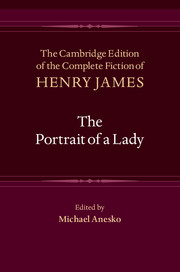Book contents
- Frontmatter
- Contents
- List of Illustrations
- Acknowledgments
- List of Abbreviations
- General Editors’ Preface
- General Chronology of James’s Life and Writings
- Introduction
- Textual Introduction
- Chronology of Composition and Production
- Bibliography
- The Portrait of a Lady
- Glossary of Foreign Words and Phrases
- Notes
- Textual Variants
- Emendations
- Appendices
Chapter 20
Published online by Cambridge University Press: 11 April 2021
- Frontmatter
- Contents
- List of Illustrations
- Acknowledgments
- List of Abbreviations
- General Editors’ Preface
- General Chronology of James’s Life and Writings
- Introduction
- Textual Introduction
- Chronology of Composition and Production
- Bibliography
- The Portrait of a Lady
- Glossary of Foreign Words and Phrases
- Notes
- Textual Variants
- Emendations
- Appendices
Summary
SOME fortnight after this incident Madame Merle drove up in a hansom cab to the house in Winchester Square. As she descended from her vehicle she observed, suspended between the dining-room windows, a large, neat, wooden tablet, on whose fresh black ground were inscribed in white paint the words—“This noble freehold mansion to be sold;” with the name of the agent to whom application should be made. “They certainly lose no time,” said the visitor, as, after sounding the big brass knocker, she waited to be admitted; “it's a practical country!” And within the house, as she ascended to the drawing-room, she perceived numerous signs of abdication; pictures removed from the walls and placed upon sofas, windows undraped and floors laid bare. Mrs. Touchett presently received her, and intimated in a few words that condolences might be taken for granted.
“I know what you are going to say—he was a very good man. But I know it better than any one, because I gave him more chance to show it. In that I think I was a good wife.” Mrs. Touchett added that at the end her husband apparently recognised this fact. “He has treated me liberally,” she said; “I won't say more liberally than I expected, because I didn't expect. You know that as a general thing I don't expect. But he chose, I presume, to recognise the fact that though I lived much abroad, and mingled—you may say freely—in foreign life, I never exhibited the smallest preference for any one else.”
“For any one but yourself,” Madame Merle mentally observed; but the reflection was perfectly inaudible.
“I never sacrificed my husband to another,” Mrs. Touchett continued, with her stout curtness.
“Oh no,” thought Madame Merle; “you never did anything for another!”
There was a certain cynicism in these mute comments which demands an explanation; the more so as they are not in accord either with the view— somewhat superficial perhaps—that we have hitherto enjoyed of Madame Merle's character, or with the literal facts of Mrs. Touchett's history; the more so, too, as Madame Merle had a well-founded conviction that her friend's last remark was not in the least to be construed as a side-thrust at herself.
- Type
- Chapter
- Information
- The Portrait of a Lady , pp. 199 - 210Publisher: Cambridge University PressPrint publication year: 2016

